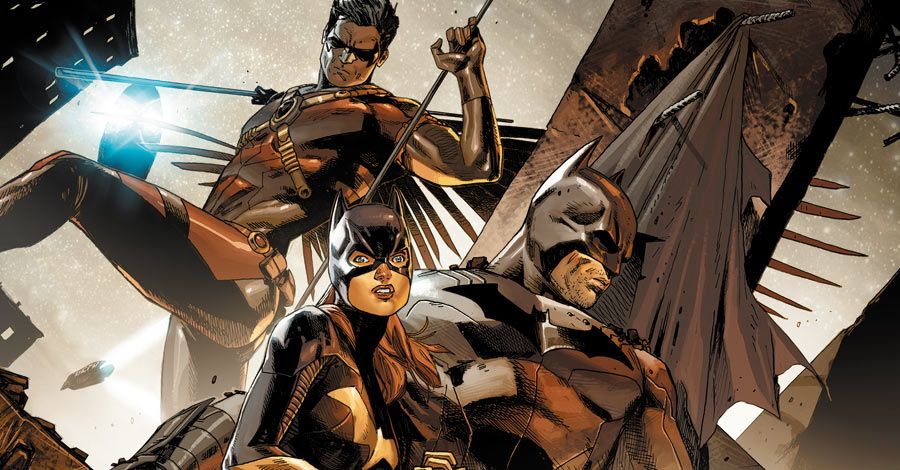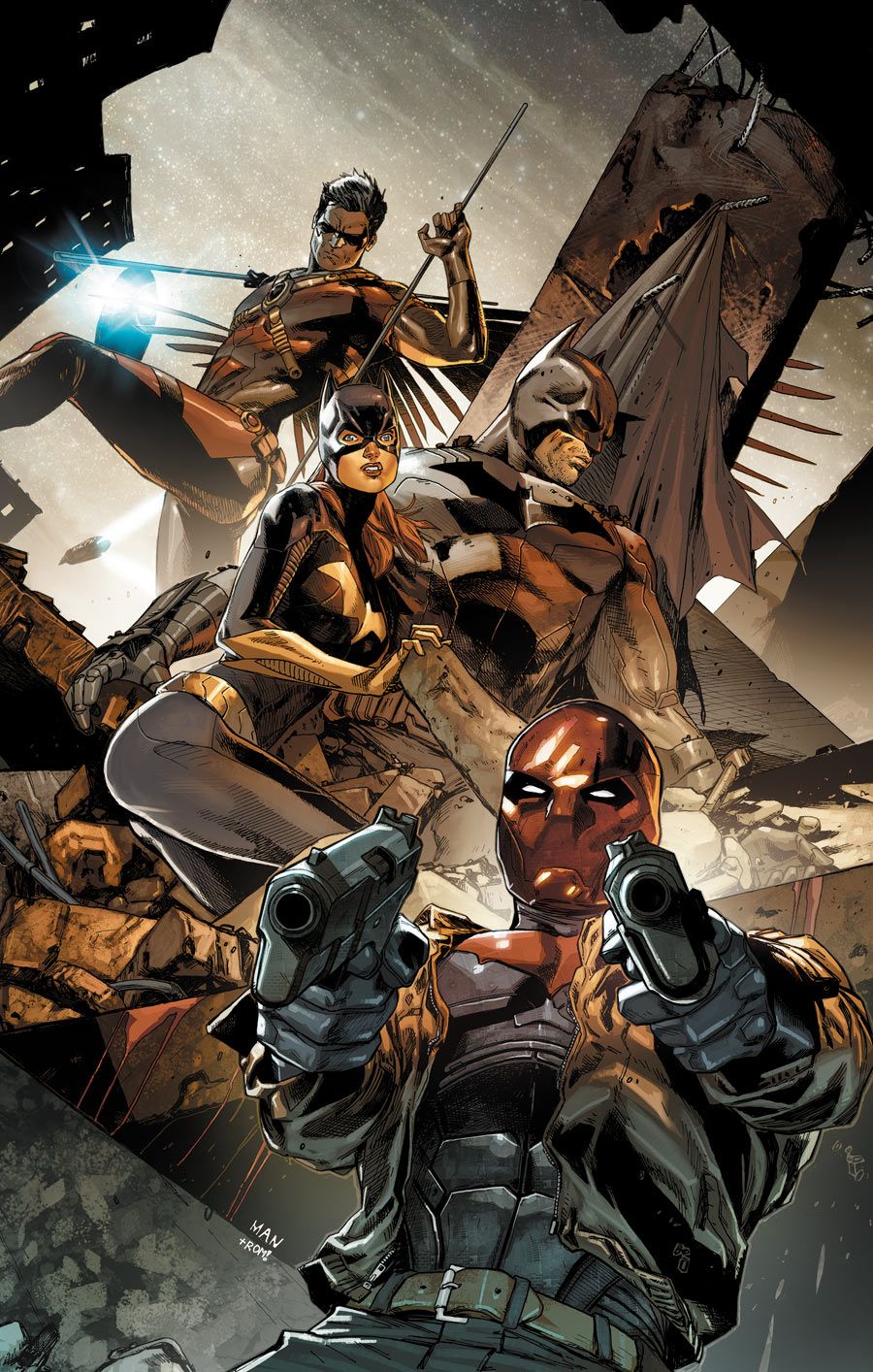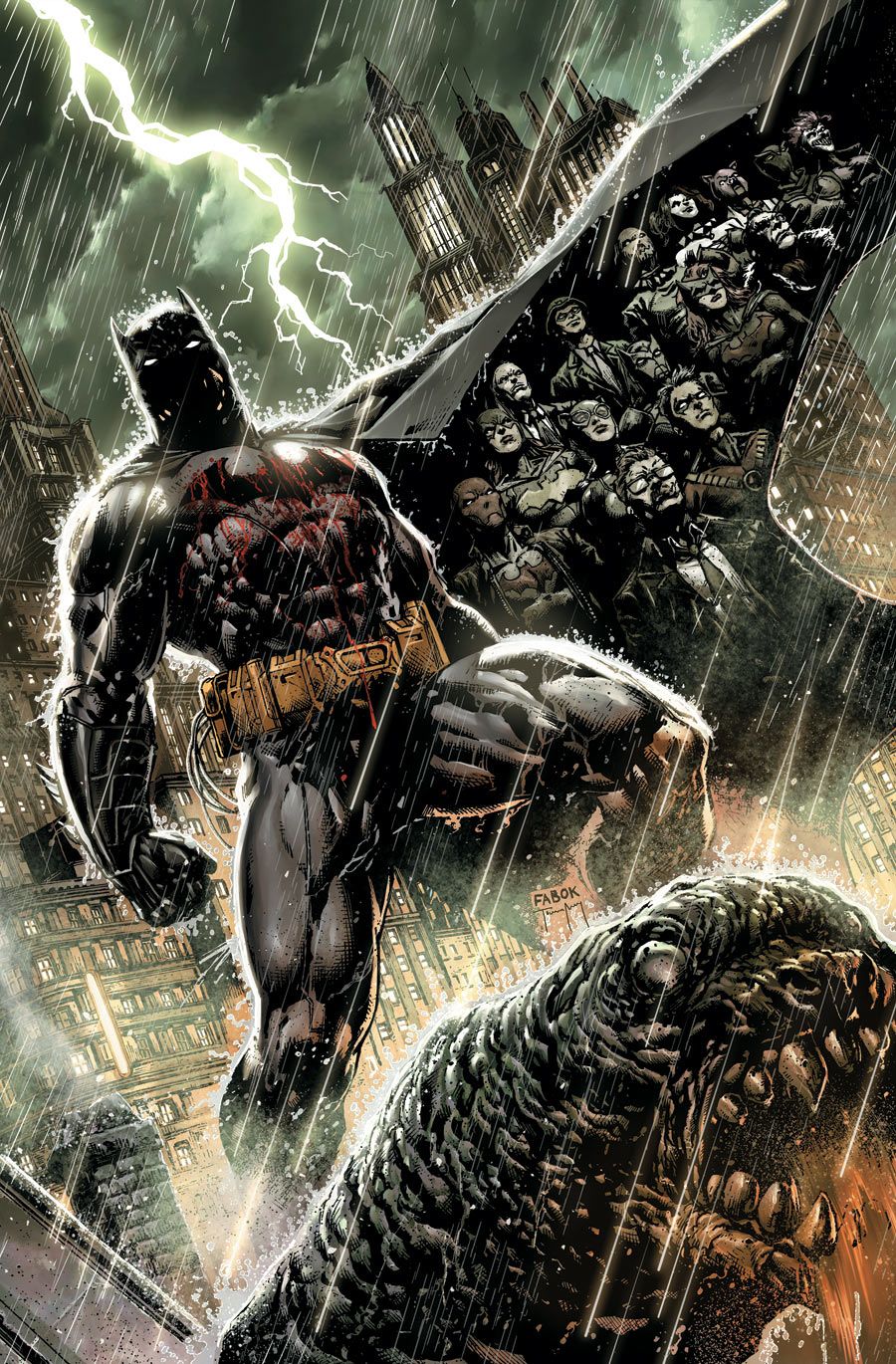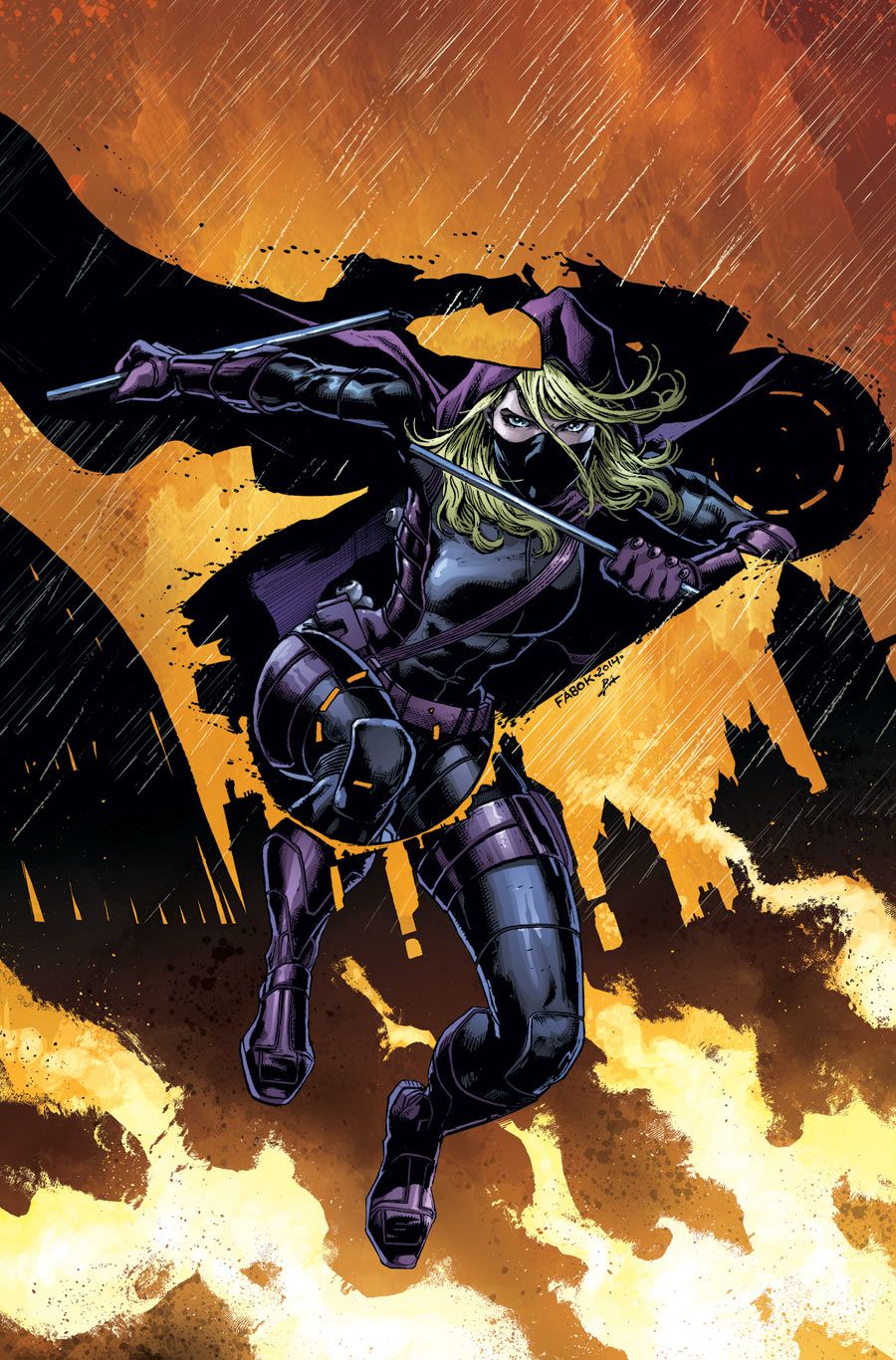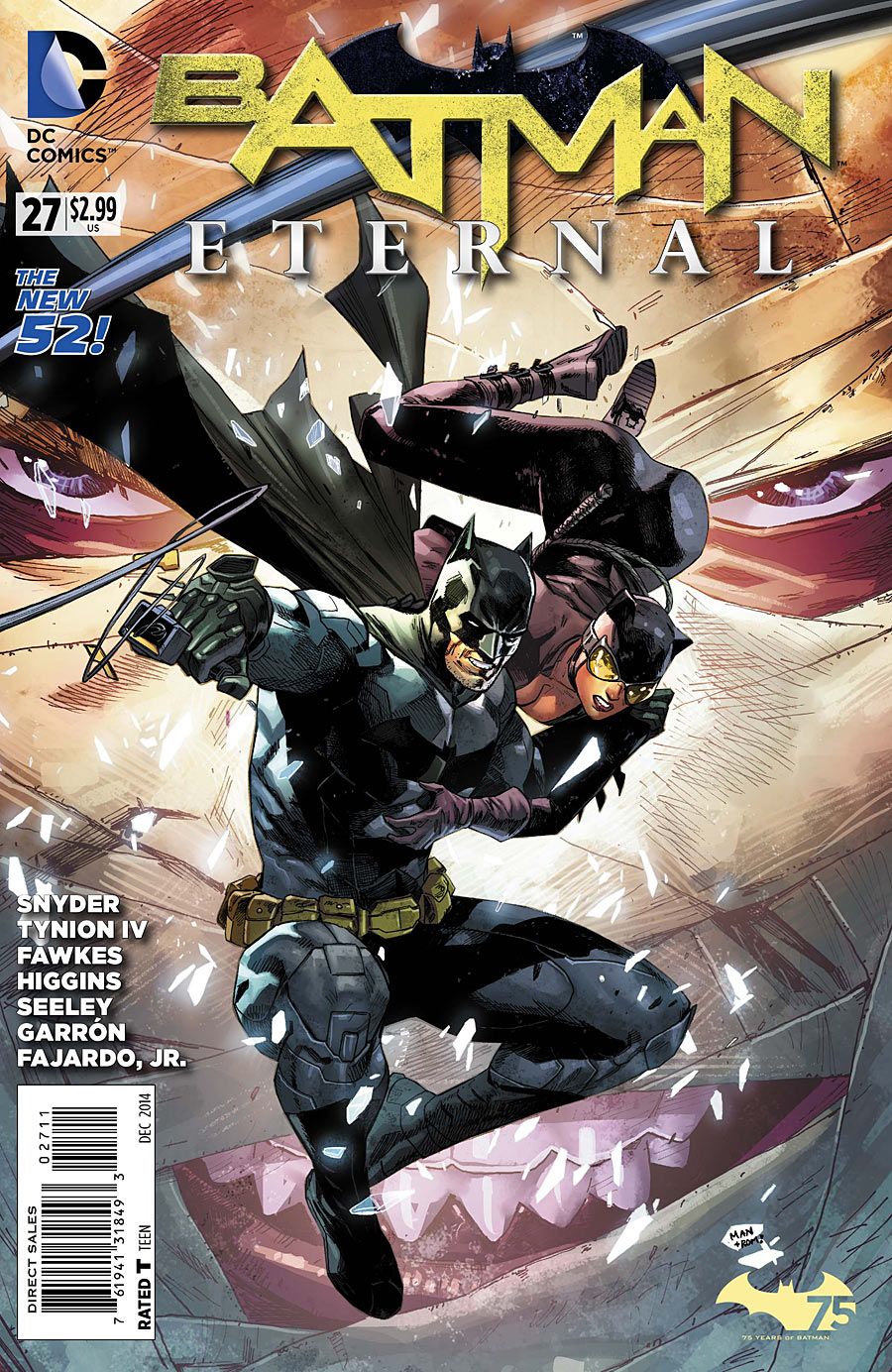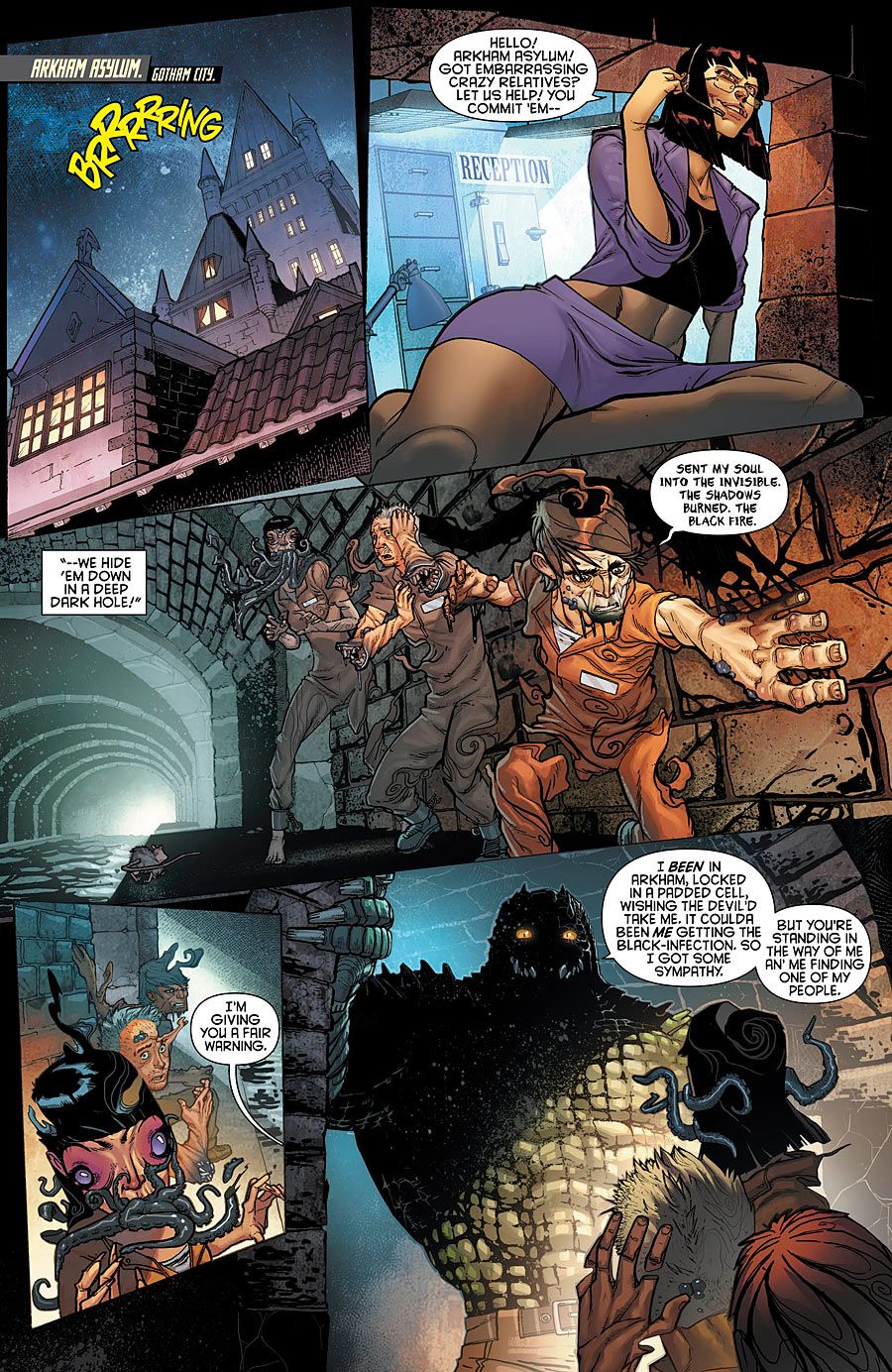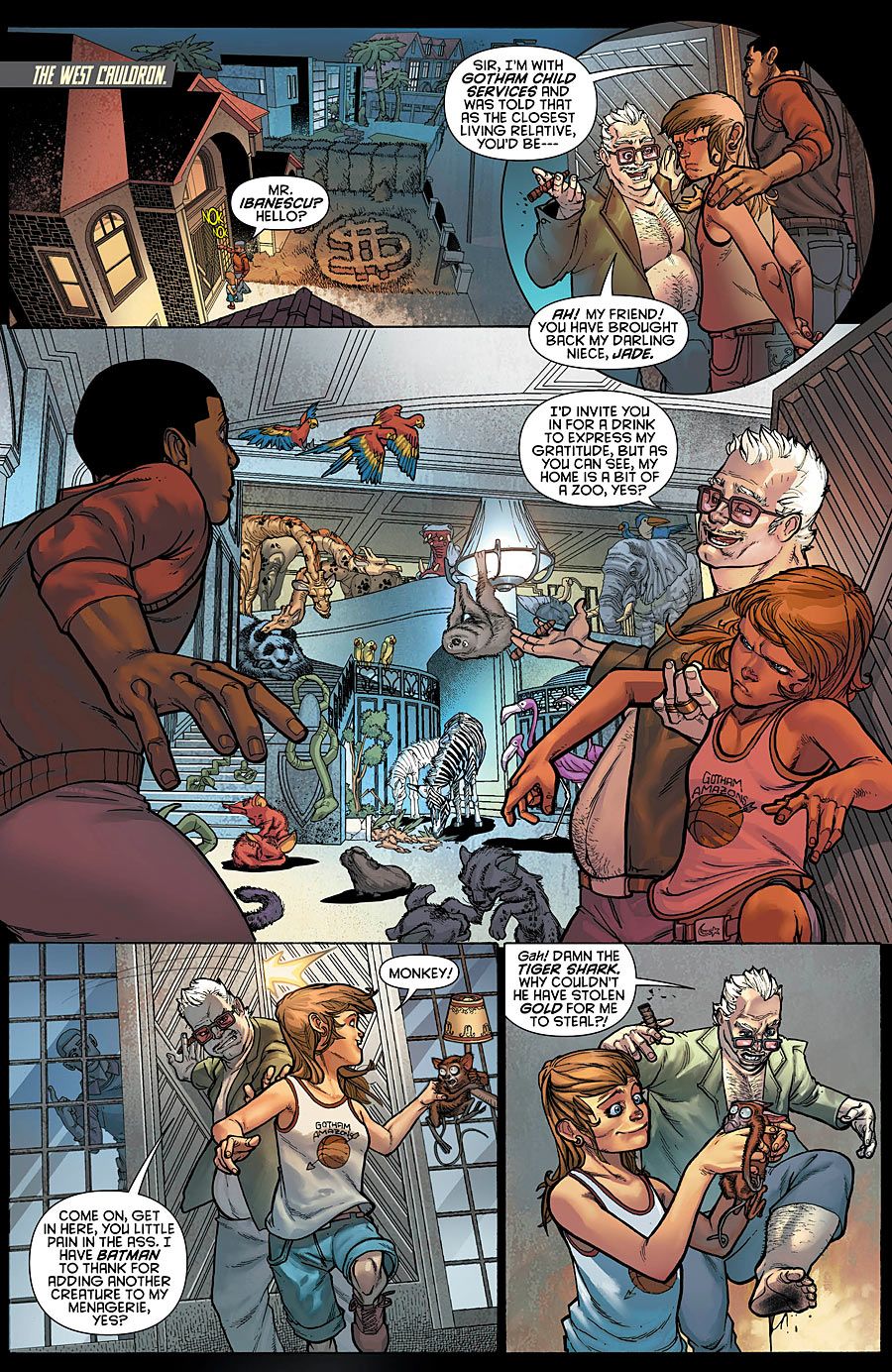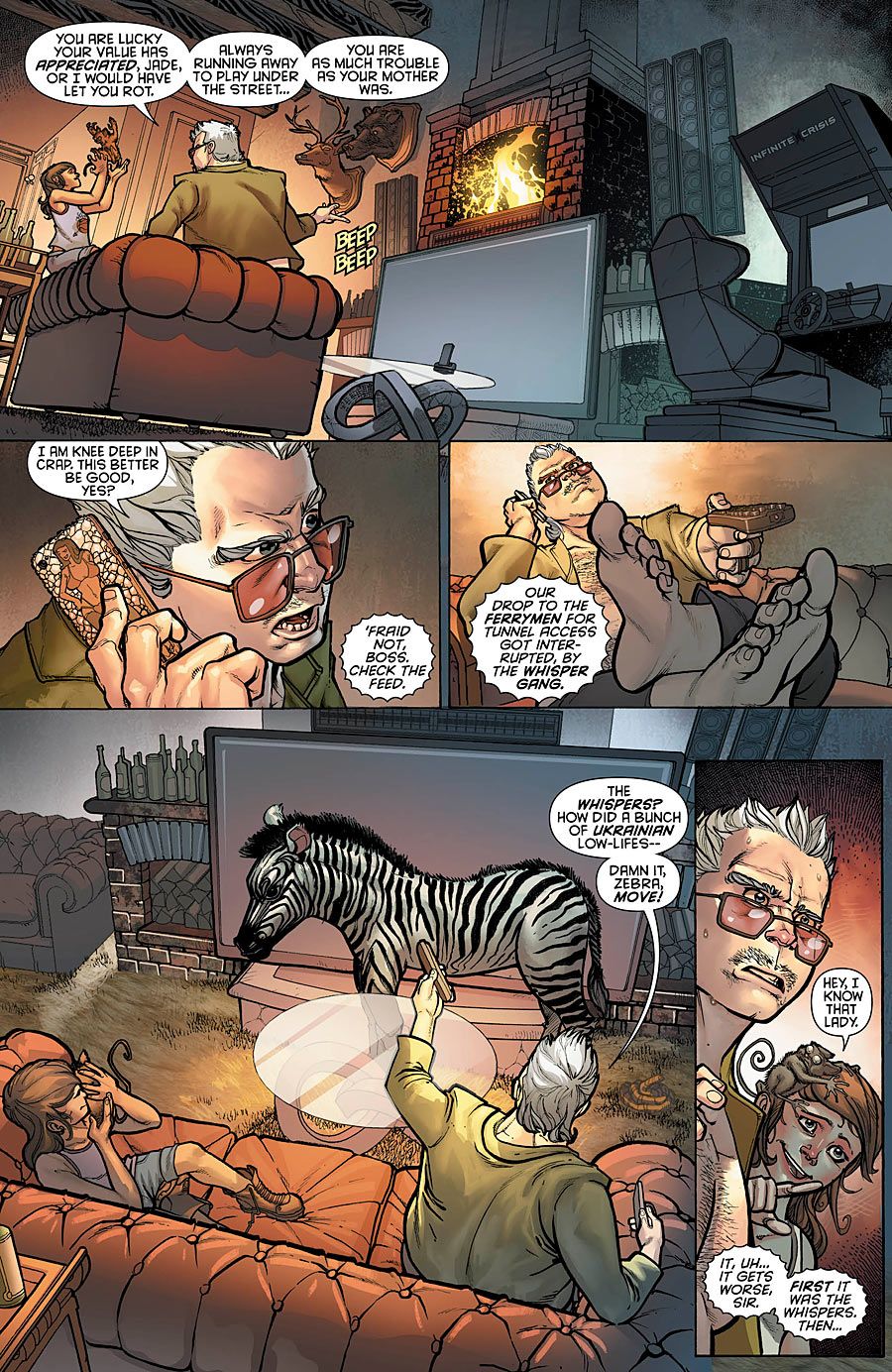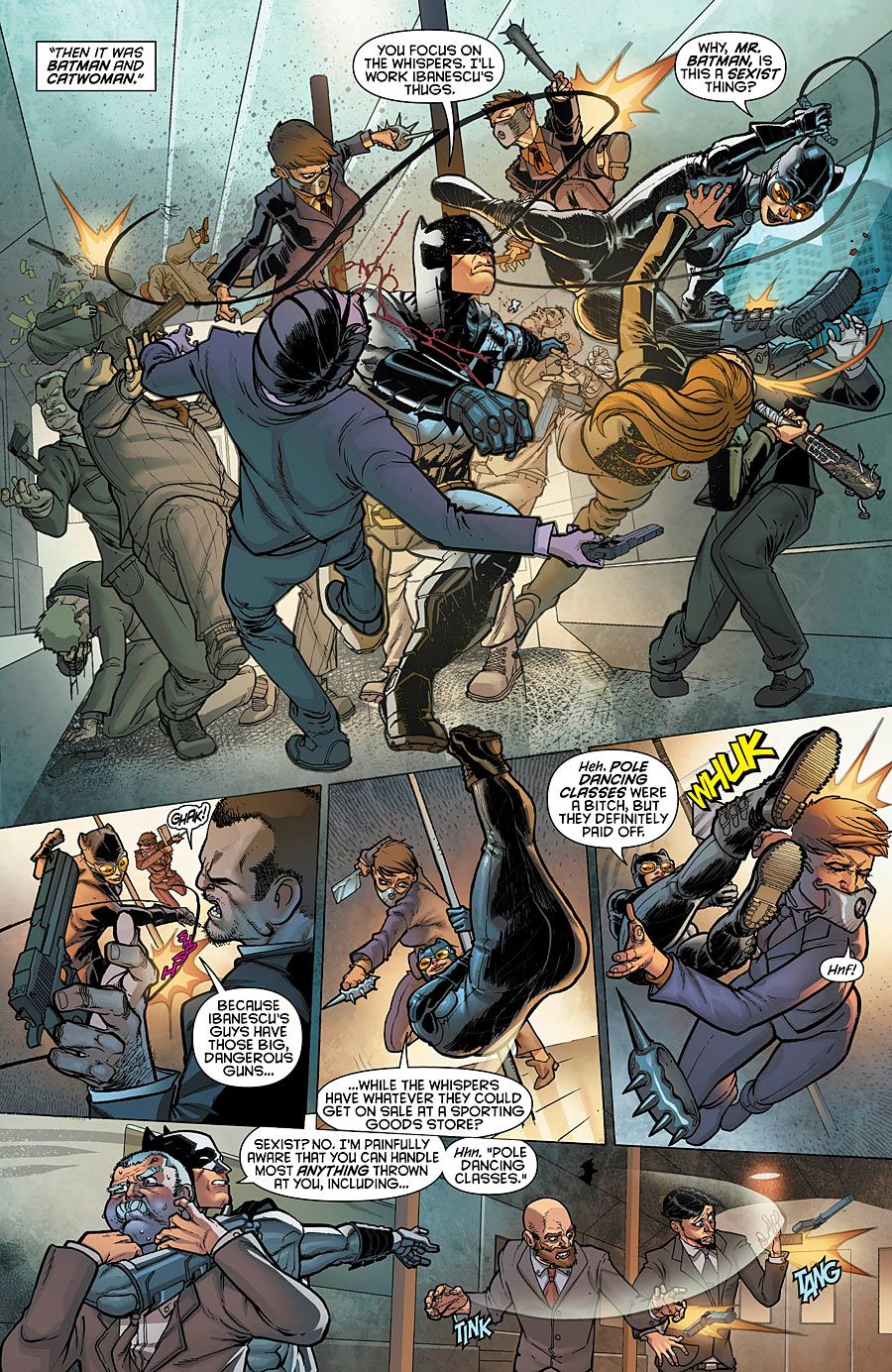[SPOILER WARNING: This article contains major spoilers for "Batman Eternal" #1-26.]
Announced last year on the eve of New York Comic Con, "Batman Eternal" hit the halfway mark of its expected 52-issue run last week.
The weekly event series, co-written by Scott Snyder, James Tynion IV, Ray Fawkes, Kyle Higgins and Tim Seeley, has been a critical and commercial success for DC Comics since its April launch and the massively diverse storyline has connected many of Gotham City's most famous (and infamous) characters for an epic celebration of Batman's 75th publishing anniversary.
Created by Bob Kane and Bill Finger in 1939, Batman made his first appearance in "Detective Comics" #27. The "Batman Eternal" writing team -- assembled for an interview on the one-year anniversary of the series' announcement and its mid-run milestone -- told CBR News that the Dark Knight's countless iterations from comics, film, television, animation and gaming have greatly inspired the 52-part story, which is not unlike the mythic "Labours of Hercules" due to the seemingly never-ending tests Batman faces each and every week.
A "Batman Eternal" Status Quo Shift and More Changes Promised by DC in December
The writers also shared their thoughts on some of the more notable characters who have made their New 52 debut in the series, namely Spoiler and Hush, and discussed the impact an imprisoned Jim Gordon has on both Gotham and Batman.
CBR News: DC Comics has enjoyed great success with weekly comic series over the past few years, dating back to the launch of "52" in 2006. With "The New 52: Futures End" and "Batman: Eternal" currently going strong and "Earth 2: World's End" set to debut next week, why do you think the weekly format works?
James Tynion IV: The big thing to understand is that we just passed the one-year mark when the first issues of the series were turned in. We've been working so far ahead of schedule while building this story and re-working it. We're been really powering ahead. The most remarkable thing throughout the whole process of "Batman Eternal," now that we're at the halfway point in terms of releasing issues, is that we really haven't run into any deadline scares or anything like that. We've just been moving ahead as the machine that we always wanted to be.
This is a big, living project and the nice thing about working in the weekly format is that we get to play around with pacing and reveals and focus on lots of little corners of Gotham. That allows us to string out tension a little longer than you might be able to do in a monthly title. It's just been a really fun format to work in and it's think it's a format that's worked really, really well for this story. And as writers, we've been able to bounce off each other really, really nicely.
Kyle Higgins: I have a little bit of a unique experience on it because I came into the project pretty late to the game, after the first 12 issues were written. I came into it not really knowing what to expect and to my surprise, everything was in really great shape. Things were mapped out for pretty much the whole year. It's a nice change of pace to come onto something and be able to fit in on a train that's not only going down the tracks but the tracks have no massive explosions happening. [Laughs] And there are no damsels that we have to save or anything like that.
It's been the smoothest thing that I've been involved with and even when there have been things like thinking we're running a little late on an issue, you step back and realize: "Oh, wait. Never mind. We're still three months ahead." It's been a really nice experience.
"Batman: Eternal" has such a large cast, all of the Robins, many of Batman's infamous rogues gallery and supporting characters from GCPD and the Gotham Gazette. How do you go about divvying up all of that screen time, and as a writing team how do you share the writing duties?
Scott Snyder: We had a lot of conference calls after we settled on a big outline for the entire thing and all of its moving pieces. What we wanted to do is really to try and give people the parts that spoke to them the most. Given Ray's interests and the books that he writes like "Constantine," the stories that would take us through the darker corners of Gotham with the more mystical characters seemed to fit best. And we tried to do that with each person. It was more of a matter that if you had a character that you wanted to use, we all got together to see if it was at all possible and if it was, we went for it. We never wanted the series to feel like everyone is writing by numbers or like this part is designated for this person regardless of their interests. We really wanted that even though every issue has all of our names on it, you could sort of tell which issue was by which person based on their interests outside of "Batman Eternal," even if it is this giant, propulsive, plot-driven machine of a story with this big engine. It also gives each of us room to explore the corners that speak to us the most organically. That was the mission and I couldn't be more proud of these guys for the work that they've done.
Being halfway through ["Batman Eternal"] in terms of publication -- and we're almost at the last issues in terms of the writing, which is crazy -- and seeing the response and support from the fans is great. I get to smile from the 30,000-foot perch but it's really all about these guys. They've been amazing. I think the series has been so strong because of the room they've given each other for storytelling and also how well they've collaborated and how sincere they've been about which characters and which elements of the story that they've wanted to pursue.
THE BAT SIGNAL: Team "Eternal" Explore The Many Faces of Batman
In "Batman: Eternal" #21, you revealed Hush as the big bad, at least through this point, of the series. Created by Jeph Loeb and Jim Lee, he's been a wildly popular character since his first story in "Batman" in 2003 though he has been equally underutilized since. What is it about Thomas Elliot that makes him work so well as a Batman rogue? And did you build "Batman: Eternal" as a vehicle for the New 52 debut of Hush or did his role in the series come about organically?
Ray Fawkes: Everything that you see has been planned from the start.
Tynion: That really is the case. Hush was in the very first iteration of the storyline. He was one of the biggest Bat villains that we hadn't seen yet in the New 52 and we thought this would be the perfect vehicle to launch something new, especially with a character that deals so much in subterfuge and secret identities. We wanted to play very much into the sense of not being able to trust anything around you. He is a character that gets under Bruce's skin -- maybe more than anyone else can. And as his former best friend, he's a great candidate as a rogue. That's really what led us to bringing him into the project but again, he's been there from the get-go.
Tim Seeley: When you are dealing with big arcs with multiple villain arcs, you are trying to connect everything together. And Hush has a long tradition of being a part of that story. So to do a new take on his original origin and have him being the guy that connects all of these things is a bit of homage but it's also us going into our own direction. And it also allows us to play with your expectations too.
You're right, because his origin has changed a bit for the New 52. Did you talk to Jim Lee about making changes? And if so, what did he think?
Tynion: I don't think we asked. [Laughs] The main reason we ended up making changes to Hush's origin is because we really wanted to streamline him in the way that all characters are being streamlined in the New 52. In this environment, we're allowed to tell new versions of these stories and we really wanted to get to the heart of the obsession that Tommy has for Bruce. And you can see that all the way back to their childhood. It's also a story for people that are just meeting the character for the first time. And I think now you really understand where he is coming from. That's really what drove us to make the changes. I sure hope that Jim and Jeph are happy with what we are doing with him.
In "Batman: Eternal" #22, Architect has an awesome line while he is knee deep in a rooftop battle with Batman: "I'm working for what's most important... my family's legacy." Alfred and Julia, Rex Calabrese and Catwoman, Cluemaster and Spoiler, Jim Gordon and Barbara and obviously Batman and Hush all have parent-child issues with their respective relationships. Is "family legacy" the core theme of "Batman: Eternal" and if so, why does it work so well in comic book storytelling?
Seeley: It's called "Batman Eternal" and the idea behind the title, and what exactly that means as far as the relationships go, is definitely the central focus of the series. The big draw for doing something like this, in my opinion anyway, was that we were able to come in and explore a lot of these characters in Gotham City, the larger tapestry of the Bat-universe. Tracing that back to the idea of what makes Batman eternal?
Tynion: Exactly. No matter the genre or approach, it's always been about family. It's something that we all recognized as being important right off the bat.
Higgins: Even at his loneliest and his most isolated, Batman stems from family. It's always about his relationship with his parents, his relationship with Alfred and his relationship with Robin. These structures and family hierarchies keep Batman around.
Tynion: And his ability to be reinvented as different versions of the character has always been really important too. That's one of things that keeps the character around so much and is also a really important part of the Bat-family. There is constant change and characters are constantly re-invented. And you can have different Robins. In the exploration of the question "Why is Batman eternal?", all of those elements became an important part of the story.
Seeley: And it's a never-ending story. It's not like a Part 1 and 2 thing. You could keep going forever.
Interesting point because while I don't want to out anyone, recently one of you hinted that "Batman Eternal" might go on forever, or at least not be limited to 52 issues. Would you be interested in continuing this storyline beyond its initially announced one-year run?
Tynion: This story that we're telling right now is a 52-part story that we designed from the beginning. But this is Batman. There is no limit to the number of stories that you can tell with that character. You can see that just on the stands. Everyday, we are getting new books set in the Bat-universe that really show the different corners of Gotham, some that we started seeding in "Batman Eternal." I think that as long as people want to read Batman stories, there will be Batman stories for them.
I think all of us here love working in Gotham City and we'll see what happens but right now we're working on the story as it stands. But this has been a great process and yeah, it would be fun to do more. I'd never turn my back on doing another big Batman story.
Spoiler is another character, like Hush, that has a rabid fanbase but hasn't been used much of late. Why do you think readers respond so well to Stephanie Brown?
Seeley: I think the big part with Spoiler is that she is a character that appears to come from a pretty normal background until she discovers what her history actually is. It's the same thing that makes Harry Potter popular. It's that thing where you secretly discover that your parents are not your real parents. And in this case, they were the villains that you thought they were. That always appeals to people. We've all thought at some point in our lives, "I don't think my parents are my real parents and I wish they were unicorn people that came down from the clouds and made everything wonderful."
Tynion: We're not supposed to reveal that Spoiler's parents are unicorns. [Laughs]
Higgins: That's actually Tim's next arc on "Revival." [Laughs]
Seeley: That's the big mystery of "Revival" -- the unicorn people. [Laughs] Wisconsin is a crazy place. That's all I'm going to say. But seriously, I think that is something that we can all relate to that idea that my parents are villains. That's why they're grounding me, that's why they're disagreeing with me, that's why mom is driving me crazy -- all of that sort of stuff builds into Steph's character. We get a superhero based on a universal ideal like revenge or responsibility like the one you get from Spider-Man or Batman and it gives you a really great base that everyone can attach to.
Higgins: Yes, she's super relatable but she's also a character, much like Tim Drake started, that is kind of a fan, as well. She's an audience proxy. I grew up reading all of the Batman stuff in the '90s with her relationship with Tim and her wanting to be a member of the Bat-family so badly. That was something that I totally related to.
Tynion: Stephanie is a character that has spoke out to a lot of people. And we wanted to put her in that audience proxy role from the beginning and have her know things that Batman doesn't. In the same way a reader, who is seeing the cutaways to the villain, knows things that the hero doesn't. It puts her in a really interesting position for the whole story. And it's been putting her in very dangerous positions too.
At the end of the day, this is a character that so many people love and care about. And we had a perfect place for her in the larger story of "Batman Eternal." And the fact that we were able to bring her back in such a prominent place not only for the fans that came before her but to introduce her to a whole new generation of readers is something that mattered a lot to us. And it's something that I'm personally really proud of. I think readers should expect to see a lot more of Stephanie outside of "Batman Eternal" right across the DC Universe.
Awesome. With the new TV series "Gotham" being built around a young Jim Gordon, his popularity with fans has never been more on display. As you've been writing over the past year, what has it been like building a Batman story with the former commissioner unavailable to serve as a moral compass for the Dark Knight, not to mention the city that he loves?
Fawkes: Part of our big villain's plan was to knock Jim Gordon out of play. Whomever is behind all of this, whether it's Hush or somebody else, knew very well that Jim Gordon moving away from Batman would destabilize Batman and would potentially destabilize all of Gotham. I think one of things that "Batman Eternal" is showcasing is, if nothing else, just how crucial Commissioner Gordon is to both the city and Batman.
Tynion: And now we're also seeing another huge support pillar for Bruce -- Alfred -- being taken out, as well. All of this is coming down to really ripping Bruce apart from the inside and making it impossible for him to act as effectively as he otherwise would.
Fawkes: It's almost like it's part of some cruel master plan. [Laughs]
Tynion: [Laughs] Almost.
This is a Batman book, so I guess I should ask you about Batman, too. You've all worked in and around Gotham during your time with DC Comics, but is it still fun to tell stories with arguably the coolest superhero to ever don a cape and tights?
Snyder: When we sat down, I think we wanted to write a story that was exactly about the title. We wanted to show why Batman was eternal. And is forever. And this is something that I'm exploring in "Batman" as well, in a different way. We wanted to show what his legacy is and turn that on its head. And we wanted to weaponize it so it almost comes after him. And without giving too much away, you can almost give it as an argument for who is coming in the end. The same things that make him forever are the same things that make him vulnerable and make him such a great human character. In "Batman," the "Endgame" arc, we explore that Batman's morality or his humanity is his greatest strength and his greatest weakness -- all at once. And we're able to explore that in a much broader and epic way in "Batman Eternal," which gives the book an entirely different flavor from "Batman" even though Bruce is Bruce in both books. The lens through which James, Ray, Kyle and Tim are looking at him is much more prismatic and really colorful and interesting. In "Batman," we're much more monolithic. We just punch him down with one thing. It's been a tremendous amount of fun watching these guys address such a huge question: What makes Batman eternal?
RELATED: Snyder Explains "Batman's" "Endgame" and #35's Major Last-Page Reveal
Fawkes: In this particular story, for me anyway, we are showcasing what is for me, one of my favorite aspects of Batman, which is his incredible human will, his ability to endure unbelievable tests, and unbelievable series of tests, yet still rise up and still inspire other people around him to heroism and still be a hero himself. We're really hitting him with everything. In this story, he's almost like Hercules. We're slamming with every possible test. And yet he still has the will to continue. Even though we're only halfway through the story, I think readers are starting to think that this never-ending, grinding attack on him is wearing him down and is wearing away at his support structure. But Bruce himself is determined to go on and I think that's very inspiring.
Tynion: Batman is so much bigger than any of us writers. He is a character that has stood for 75 years through so many different iterations. Jeff, you brought up "Gotham" a few questions ago, which is another iteration popping up and there are so many iterations in films and animation and everywhere. This is a character that spans across all forms of media and all forms of storytelling. He expands beyond the iconic character because of his core message, which is that you can become something that overcomes the worst thing that you imagine.
Everyone has the worst thing that has happened to them in their lives. And they've had to rebuild themselves and become something new, and Batman is the best possible example of that. Batman had the worst thing happen to him that can happen to a person and he managed to build himself up into something that would fight that every single day -- forever. And that's something that all of us want to do on some level. That message reverberates through everything and all sorts of stories. Here, we're trying to showcase different aspects of the character and his different relationships and at the end of the day, it's exciting and intimidating to sit down and make our own marks on the character and do stories that will add to that incredible legacy.
Snyder: When most people think about Batman, they think about him inspiring fear in criminals. And he's incredibly bad ass in that regard. But when you work with him for a while or you work on a book like "Batman Eternal," like all of us, what you realize is that what makes him endure is that he is inspirational even more than he's scary. The scary stuff is fun. That makes him fun to write. But ultimately, like James said, he's someone that teaches us to resist our own fears and become the pinnacle of our own aspirations. That's one of the things that's so wonderful about writing him in this story. Like Ray was saying, you throw a challenge at him and it seems completely insurmountable but he overcomes it. But the thing that you remember is that he is human and that he has no superpowers yet he stands beside all of these gods in the Justice League. And they look to him for advice because he is the best. [Laughs]
Obviously you can't give too much away, but things aren't looking good for the good guys and -- pardon the pun -- the inmates are basically running the asylum. Can you give us a tease of what's to come in the weeks and months ahead?
Fawkes: Pretty soon it is going to get so bad that you are going to say that there is no actual way that Batman can get out of this. And then, of course, Batman is going to get out of it. [Laughs]
Snyder: Well don't give it away. [Laughs] He might die. Maybe Batman is not eternal. But honestly, we populated the series with all kinds of surprising villains and heroes on both sides and we're only halfway done. It's funny to see the tweets and forum posts saying that Hush is the big bad. It's like, "You're at #25, dude. Do you think Hush is going to sit around for the next 27 issues speechifying about how he took down Batman?" Of course there is going to be some bigger bad guys behind him.
We are only halfway done and these guys have done such an incredible job of throwing everybody in there that you would want to see and everybody else that [readers] wouldn't even think of.
The other thing to remember is that this Batman's 75th anniversary so we wanted this to be a celebration and exploration of Batman's incredible mythology and cast. A lot of the fun comes from having characters that you wouldn't expect show up from Deacon Blackfire all the way to the biggest -- and smallest -- rogues. These guys have more terrific surprises coming for everybody.
Tynion: Right before "Batman Eternal" launched, Scott and I wrote a preview issue in "Batman" #28 and we saw elements that we would be building towards in the series and we're pretty much at that point. We're seeing martial law unfold in Gotham City. We're seeing Spoiler become this huge, valuable target all across Gotham. We're seeing the GCPD run by someone that doesn't have the best interests of anyone in the Bat-family or Gotham, regardless of his own motivations, in mind.
The Jason Bard reveal from a few weeks ago showed that he wasn't the person that everyone thought he was and that we were building him toward. That's the thing that should be evident to what we've been building since the very beginning in "Batman Eternal" #1 and all of those things are going to pay off.
We're also going to see characters come back that you don't expect and things that you might have skipped over and thought were non-crucial events all of sudden will come back to center stage and dominate the story. We have been playing with all of the different strings of the story and now we're going to see it all crash together, building up to the third act of the story, which is going to have some of the most bombastic, crazy things that we were capable of thinking of. And I could not be more excited for readers that get to see what we have in store for them.
Seeley: I am just finishing the lettering on an issue right now, but it's really cool. We have some stuff in the second act that builds into what James is talking about in the third act and it takes some of qualities of Batman like his tactics and his tools and inverts what you would expect in a big, interesting way that begs a lot of moral and ethical questions. And that's the stuff that's so attractive about what we're now just getting into.
Snyder: The last thing that I want to say is that I know the series seems intimidating if people are reading this and wondering if they should jump on or not because it's so big and sprawling but these guys have done a great job making it extremely accessible so if you haven't been reading it, you could honestly easily jump in to any issue because it's been structured in very, very distinct arcs. You can still have a lot of fun with it as it steamrolls toward the end. Don't be intimidated by it. Come to Gotham.
I would always be intimidated to come to Gotham. [Laughs] I have one final question, you've teased a big bad behind Hush. Are we going to see the biggest and baddest of them all, The Joker, in "Batman Eternal?"
Snyder: [Pauses] You're going to have to wait and see.
"Batman Eternal" #27 is on sale now, and the series continues weekly from DC Comics.

